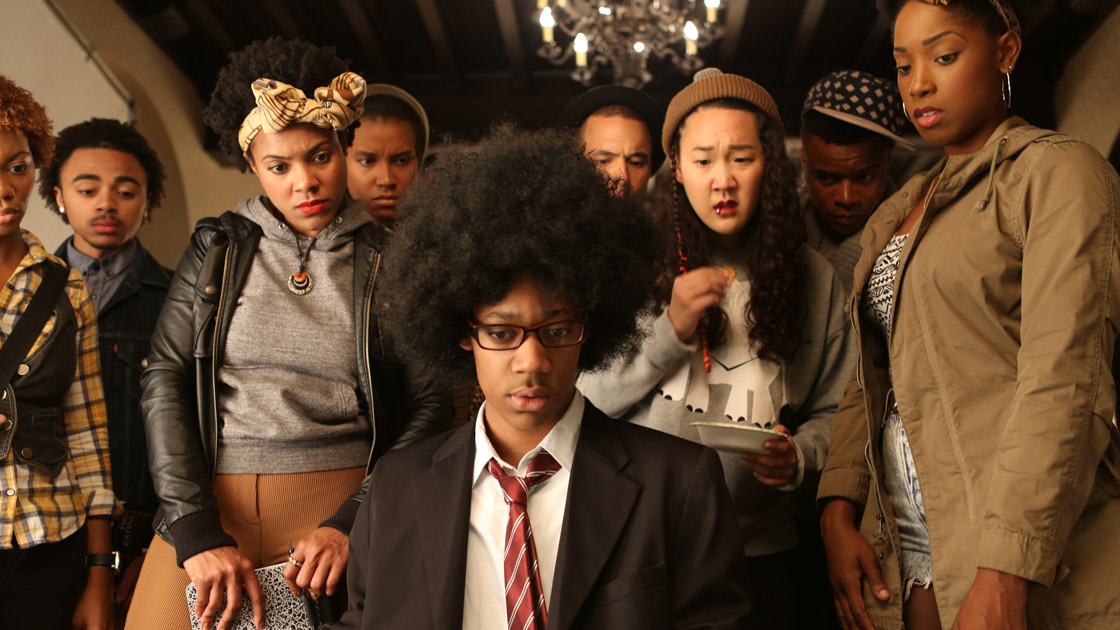Dear White People has no interest in hearing the Caucasian side of the conversation. Scathing and necessary, Dear White People gets right to the point about race relations after the Civil Rights movement. While the movie is not quite in Spike Lee’s realm, it does bring an interesting new voice to the forefront: Justin Simien. With more polish and practice, Dear White People could become the stepping stone Simien uses to elevate himself into one of the great cultural filmmakers of the modern era.
Dear White People is a reference to Sam’s (Tessa Thompson) radio show at Ivy League equivalent Winchester University, in which she informs ignorant white folk like Kurt Fletcher (Kyle Gallner), the University President’s (Peter Syvertsen) son, about the new rules in race relations. Sam’s fiery personality gets her elected head of her dorm over Troy (Brandon P. Bell), the Dean’s (Dennis Haysbert) son. Her newfound power draws the attention of many, including Colandrea ‘CoCo’ Conners (Teyonah Parris), who’s jealous of Sam’s personality, and Lionel (Tyler James Williams), a shy gay writer who’s trying to attract the newspaper editor (Brandon Alter).
Dear White People is a movie for the here and now. The school I attended had a blackface party on campus, one of the plot points of Dear White People. Fox News is directly attacked as a bearer of white conservatism. 2 black friends are now necessary so no one can just claim their token one. Racism is apparently now over because we have a Black President; in fact, we have reversed racism with affirmative action. Dear White People holds nothing back while skewering double standards and tentposts of the good old days. The movie’s best attribute is pointing out just how subtle racism is now: gone are the days of the overt bigot. Ironically, this vicious assault on the now holds back Dear White People from becoming legendary; systemic injustice and things like code words and positions of power are in the background or not present at all. By aiming for specificity over ubiquity, Dear White People’s sharp edges will be smoothed out over time, leaving the movie as a powerful period piece with something left on the table.
With the satire front and center, the characters of Dear White People are archetypes with hopes of becoming fully realized. Sam and Lionel have diverging arcs that give their characters completeness, and the development of the two of them give them strong backstories. Coco is also a fascinating character: a black woman attempting to cover up her blackness but desperately longing to be famous. Other than those three, Dear White People’s ensemble is too big to elevate past archetype, the most disappointing being daddy’s boy Troy and privileged white Kurt. I will say this though, no character exists solely to be the villain in Dear White People; there is enough nuance to earn each character a place in the film.
The cast of Dear White People does great work with the material, using relatively unknown actors to give the movie freshness. Tyler James Williams (from Everybody Hates Chris) is one of the bigger names; he earns his top billing as Lionel, selling his confusion about his identity along with a powerful personal drive. Tessa Thompson breathes fire as Sam while exposing the vulnerability underneath the cocky. Teyonah Parris has the most underwritten but well executed role as the conflicted Coco. Brandon P Bell does what he can with Troy’s underwritten part. Dennis Haysbert, Kyle Gallner, Marque Richardson, Justin Dobies and Peter Syvertsen let the jokes and brutal honesty fly with aplomb.
Leaving the theatre after seeing Dear White People, an Akon song popped up on my playlist, and thanks to what I saw, I couldn’t help but cringe a little. Dear White People helps the audience understand the world they live in now, and all the unwritten rules that govern and confuse every inhabitant. I also learned that nose jobs in the black community actually double as code words.

